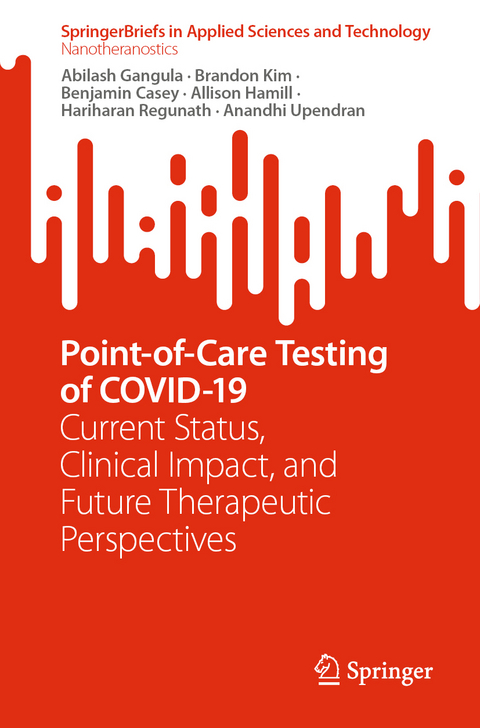
Point-of-Care Testing of COVID-19
Springer Verlag, Singapore
978-981-19-4956-2 (ISBN)
Abilash Gangula is a post-doctoral research fellow in the Department of Radiology, University of Missouri-Columbia. He has obtained his doctoral degree from Sri Sathya Sai Institute of Higher Learning, Prasanthi Nilayam, India, on the thesis entitled “Studies on the catalytic and sensing applications of Gold Nanoparticles.” His research interests include the synthesis and application of bio-nano-conjugates for point-of-care diagnostic platforms and targeted drug delivery in cancer therapy Brandon Kim is a student researcher in the fields of radiology and neuroscience at the University of Missouri-Columbia. He has worked on projects such as the development of a rapid COVID-19 antigen test for local use through diagnostic gold nanoparticles and is currently working on a project on the possible link between glial activation through outside stresses or immune response and retinal-degenerative diseases. Benjamin Casey is an alumnus of the University of Missouri-Columbia. He obtained Bachelor of Science in Biological Engineering. His emphasis track throughout his undergraduate career was pre-medicine. Allison Hamill is an alumnus of the University of Missouri. She has a Bachelor of Science in Biomedical Engineering, emphasizing Bioinformatics. With her technical and medical background in Bioengineering, she now works at Epic Systems Corporation to support healthcare software across the globe. Hariharan Regunath received the M.B.B.S. degree from The Tamil Nadu Dr. M.G.R. Medical University, India, and the M.D. degree from Manipal University, India. He received additional residency training in internal medicine and fellowship training in infectious diseases and critical care medicine at the University of Missouri, Columbia. He is currently an Assistant Professor of clinical medicine with the Department of Medicine—Divisions of Pulmonary and Critical Care Medicine, and Infectious Diseases, University of Missouri. His current interests include COVID-19, ARDS, nosocomial infections, infective endocarditis, clinical microbiology, CMV infections, and travel medicine. Anandhi Upendran is a Lead Scientist and Director of Biomedical Innovation in the office of medical research, School of Medicine, University of Missouri (MU). She received her Master’s from Madras University and her Ph. D. from the Indian Institute of Science, Bangalore. She received her certificate in Regulatory Affairs (Drugs and Devices) from Regulatory Affairs Professional Society (RAPS, USA). At MU, she leads a research program focused on “Clinical Translation of Drug Delivery and Biomedical Devices”. She serves, trains and educates undergraduate, graduate students, and early-career scientists in biomedical innovation through the “Life Sciences Innovation and Entrepreneurship” graduate certificate program. Her team conducts the preclinical evaluation of new nanomaterials for effective translation to humans. She has published several peer-reviewed articles in high-impact journals and issued US patents.
Introduction.- Methods.- Choice of clinical specimen for COVID-19 testing.
| Erscheinungsdatum | 05.10.2022 |
|---|---|
| Reihe/Serie | Nanotheranostics | SpringerBriefs in Applied Sciences and Technology |
| Zusatzinfo | 11 Illustrations, color; 2 Illustrations, black and white; VIII, 71 p. 13 illus., 11 illus. in color. |
| Verlagsort | Singapore |
| Sprache | englisch |
| Maße | 155 x 235 mm |
| Themenwelt | Medizin / Pharmazie ► Medizinische Fachgebiete ► Psychiatrie / Psychotherapie |
| Naturwissenschaften ► Physik / Astronomie ► Angewandte Physik | |
| Technik ► Umwelttechnik / Biotechnologie | |
| ISBN-10 | 981-19-4956-5 / 9811949565 |
| ISBN-13 | 978-981-19-4956-2 / 9789811949562 |
| Zustand | Neuware |
| Haben Sie eine Frage zum Produkt? |
aus dem Bereich


